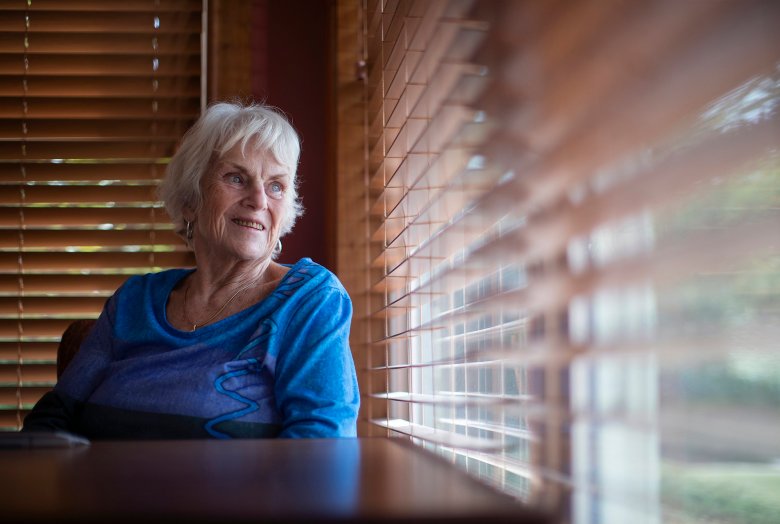Sherlyn Morrissette said she was in no condition to make decisions after her husband died three years ago. It was her children who told her she should come to Maine and live near them instead of staying in her home in rural Lyndonville, Vermont. Looking back, she’s very glad they did.
“When you lose a spouse after 56 years, you’re just numb, and you feel like you can’t make decisions,” said Morrissette, 82, who lives at OceanView, a retirement community in Falmouth. “I can’t tell you how much it affects your mind. I was very unbalanced, and I was constantly falling.”
“I think if I stayed there by myself I would have probably become very, very depressed,” she said.
Even though she didn’t decide on her own to move out of her home, Morrissette said she can see many reasons why it made sense for her. She’s a healthy, active, social person who now has many people to talk to every day and a calendar full of activities, including trips to plays, musicals, and Portland Sea Dogs games.
—
We all could face difficult decisions as we get older, including whether we want to or are able to live alone or whether we want or can afford to live in a senior living community or other facility. Health problems or failing eyesight may force us to give up driving. A desire to plan for the end of life will likely have us considering wills or trusts and health care directives.
Those who work with aging Mainers say one way to start thinking about these decisions is to talk to people who’ve already made them — about what factors they considered or what problems they dealt with.
—
Paula Hodgdon, 97, taught physical education and coached at the University of Southern Maine. She lived alone in her home in Hollis before moving to Scarborough Terrace last year. She said her family was worried about her living alone, but she wasn’t; she had friends and neighbors who would bring her things she needed, and she felt comfortable there.
But she said she decided to “try” living in a senior living community to see what it was like.
“They thought it would be a good idea for me to come here, but I didn’t really want to do it at first. So they said ‘Just try it,’” said Hodgdon. “After being here, I’ve changed my mind and decided it’s a very good place to be, because they take care of anything you need.”
—
According to the Maine Health Care Association, there were 1,000 assisted living and residential care centers in Maine as of July, varying in size from a few beds to more than 100. Among the residents of all those facilities:
– 49% were over the age of 85
– 30% were between the ages of 75 and 84
– 15% were between the ages of 65 and 74
– About 7% were younger than 65
—
Hodgdon’s friend and fellow retired USM professor Jim Pendleton, 93, also came to Scarborough Terrace recently. Health issues had forced him to stop driving a few years ago, and his wife became his driver. But she died last year.
In 2022, about 93% of people 65 and older in Maine had their driver’s licenses, according to a project done by the Maine Council on Aging with data from the Maine Department of the Secretary of State. For people 80 and older, 72% had licenses that year.
Pendleton said he had fallen a few times and decided that it would be better for him not to live alone in his Buxton home. He also didn’t want family worrying about him.
Besides moving into Scarborough Terrace, Pendleton wrote a health care directive so his children would know what sort of care he wants and doesn’t want near the end of life. He’s also given his children his power of attorney.
—
He said that will make anything that happens to him, including dying, easier and less complicated for his family.
“If you don’t have those kinds of things in place, you just make it miserable for your family,” said Pendleton, who taught geology. “Just because you’re dead doesn’t mean you don’t care about your kids.”
—
Giving someone power of attorney gives them broad authority to handle all your financial and legal matters, like paying bills or managing investments. An advance health care directive is focused more narrowly, giving someone the authority to make health care decisions and laying out your own wishes on end-of-life care.
Having either document gives a person confidence that someone they trust will be making decisions for them if they can’t, people who work with seniors say. It also means your family will know exactly what your end-of-life wishes are and helps avoid disagreements or court battles among family members.
—
Morrissette has not given up driving and has no plans to. She’s healthy and has fun at the wheel of her bright blue Audi convertible. She’s also planning to take a trip soon to Antarctica.
Physically, she feels like she could live alone. But being able to live in an active community and see so many people every day has helped raise her spirits and energy.
“I meet a lot of people who have very uplifting attitudes and live life to the fullest,” said Morrissette.
https://www.pressherald.com/2025/10/18/how-older-mainers-decide-when-to-downsize-stop-driving-or-ask-for-help/

Be First to Comment